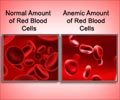Highlights
- Low levels of thyroid hormone due to iodine deficiency causes anemia though the reason remains unknown.
- Thyroid hormone thyroxin was found to stimulate maturation of red blood cells.
- A specific type of receptor inside maturing red blood cells binds to thyroxin without which, it may cause anemia.
They tested the serum to find out the factor that prevented the red blood cells to mature. Charcoal was used to attract and retain hydrophobic (water repellent) molecules. Once filtered, the serum no longer supported red blood cell production. One of the hydrophobic molecules trapped by charcoal must be the key to the final step of red blood cell maturation.
Red Blood Cell Formation
During the development of red blood cells, specialized bone marrow stem cells mature through several stages until they finally turn on the genes for hemoglobin and other red blood cell proteins and become mature red blood cells.
In order to simulate this process in the lab, researchers have previously found that culturing blood cell progenitors in serum helps them turn on all of the proper proteins to take the final step and become a red blood cell.
Gao and Lee determined that when just the thyroid hormone thyroxin is added back to the serum, the red blood cell progenitors once again start down the path to maturation.
Gao and Lee then teased apart the mechanism behind thyroid hormone’s effect on red blood cell maturation. They pinpointed the specific type of receptor inside maturing red blood cells to which thyroid hormone binds. From there, they identified a protein that is necessary for thyroid hormone stimulation and that acts as a regulator of the final step of red blood cell production.
With this better understanding of the connection between thyroid hormone and red blood cell maturation, scientists may be able to identify new therapies that trigger red blood cells maturation in patients with specific types of anemia, including those with an underactive thyroid.
Functions of the Thyroid Gland
- The thyroid gland secretes two hormones thyroxine (T4) and triiodothyronine (T3) which is released in the blood.
- The hormones influence the metabolism of the body cells.
- Growth in children and regulation of body temperature, activation of nervous system and heart beat regulation are the main functions of the thyroid gland.
- If too much of the thyroid hormones are secreted, the body cells work faster than normal it can cause weight loss, scanty periods, brittle hair, frequent bowel motions or even diarrhea. if too little of the thyroid hormones are produced, it can cause tiredness, feeling cold, weight gain, poor concentration, depression.
- Gao and Lee, Mystery solved: How thyroid hormone prods red blood cell production, Proceedings of the National Academy of Sciences (2017).
- http://www.btf-thyroid.org/information/your-thyroid-gland.
Source-Medindia














